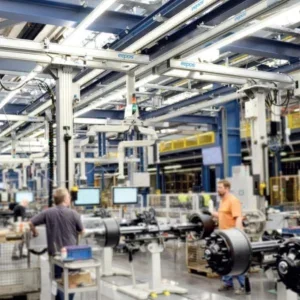As Pinkham says, the market fundamentals for the North American primary metals industry continue to be very positive resulting in the metal producers having money in their pockets and being willing to spend it on both greenfield and brownfield expansions. That is good news to crane suppliers as many of these expansions, especially those involving new greenfield facilities, mean the purchase of several kinds of overhead lifting equipment.

“Demand is pretty strong from primary metal producers. We are getting a lot of inquiries,” says Gene Buer, executive director of the crane group of Columbus McKinnon Corp., Amherst, New York. Jim Lang, general manager for inspections and training for Morris Material Handling, Oak Creek, Wisconsin, agrees, stating that business is not only strong for new equipment but for the servicing of equipment as well.
The steel industry offers a unique opportunity for European companies too, with the overhead crane field seeing growing demand from the sector for technologically advanced lifting solutions. Some manufacturers are taking advantage of these market conditions.
Receiving international orders, especially from a sector as buoyant as steel, helps firms to cope with inevitable fluctuations in domestic business.
According to Italians Meloni Tecno-Handling, the steel industry is one of the most profitable fields around, “but is also a business where technological knowledge and references are the first trade barrier and where reliability does not allow any compromise.”
Interestingly, Meloni Tecno-Handling has developed an overhead crane especially for the steel market, allowing “the operator to change the centre-to-centre distance between the lamellar hooks so it can hoist a ladle or a bucket,” it says.
A unit has recently been installed at the ALPA (Aciéries et Laminoirs de Paris) plant in Gargenville, part of the RIVA Group.
The growth of new steel mills has been occurring both in the flat roll and long products areas.
“I think it is pretty clear that there is a lot of infrastructure building going on throughout the world,” says Buer. “China has been a big part of it. That is creating a lot of demand for raw materials,” and has sparked a number of expansion projects.
Michael Lipscomb, regional sales manager for Foley Material Handling, Ashland, Virginia, says this has been the case with several core primary metals companies that his company does business with, particularly in the steel, titanium and nickel-based superalloys sectors.
How is the steel market influencing your business?
Richard Howes, Editor






